#jeanne fránçaix
Photo
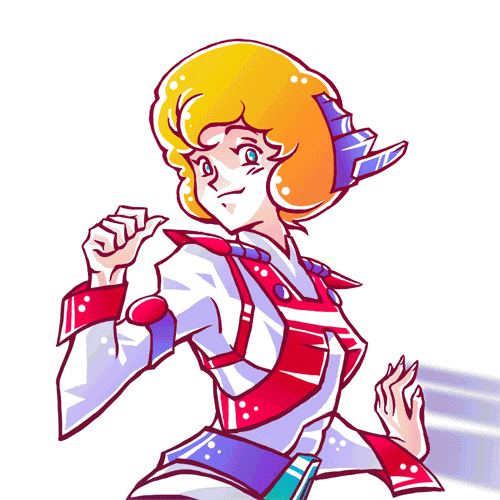
Dana Sterling. Robotech / Jeanne Fránçaix. Southern Cross
16 notes
·
View notes
Video
ANS-2011 Miss Jeanne Fránçaix : Hoshi No Déjà-Vu / Yakusoku (Promise) by Yuina Yui
Via Flickr:
Happy 37 th in 2021 , April 15 (Sunday) in 1984. ANS-2011 Hoshi No Déjà-Vu _ Yoko Katori - VGMdb The Original Sound Track of the Super Dimension Cavalry Southern Cross (OST) - Robotech Chronicles【 超時空騎団サザンクロス・サウンドトラック - ロボテック・クロニクル】
#SouthernCross#SuperDimensionCavalry#SuperDimensionCavalrySouthernCross#超時空騎団サザンクロス#超時空要塞マクロス#超時空シリーズ#Robotech#RobotechMasters#RobotechRemix#ジャンヌ・フランセーズ#Dana#Sterling#Michie#Tomizawa#富沢美智恵#BarbaraGoodson#KumikoMinakura#水倉久美子#土井美加#MikaDoi#EdieMirman#EdithMirman#AkiraKagami#鏡味晃#かがみあきら#湖川友謙#日高のり子#Melora#Harte#メローラ・ハート
1 note
·
View note
Note
What are the differences between a typical Super Robot protagonist and a Real Robot protagonist?
Hi thank you for the Ask!
I touched on protagonist traits in “Shōnen Mecha Protagonists”—and while that post focuses on male protagonists—those traits are a good starting point because the differences between the typical Super Robot protagonist and the typical Real Robot protagonist are more related to the setting and tone of the story, and the age of the protagonist, than they are to the mecha genres themselves.
The differences are not many, as the premise of any mecha story is that, somehow, the main character(s) come into possession or command of one or more giant robots that are instrumental towards resolving the main conflict of the story. That premise requires certain traits, backgrounds, attitudes, and abilities.
Approach to Age:
The few differences that exist are determined by the interplay between: setting, tone, and age. Both Super Robot and Real Robot can take place in fantasy or science-fiction settings, and both can have light or dark tones. Given the origins of the mecha genre as a whole—a reaction borne of Japan’s collective multi-generational trauma from the nuclear bombings of Hiroshima and Nagasaki—even a story with a “light tone” will be a little dark at times. A “true” (for lack of a better word) light tone is usually only found in parody, and sometimes (but not always) stories where the protagonist is a child (8-12). That is why the differences between Super Robot and Real Robot protagonists are determined by age relative to setting and tone, rather than genre.
What you’ll end up with is something like this: a 14-16 year old protagonist in a Super Robot story is likely to have more in common with a 22-26 year old protagonist in a Real Robot story than they will a 9 year old protagonist in a Super Robot story. The 14-18 range is weird and is where all the teen angst and drama will be found, and yet 17-20 is a common age range for highly competent protagonists regardless of Super Robot or Real Robot. Protagonists under the age of 14 are less common, but they have a set of typical traits (re: my Shōnen Mecha Protagonist post). When their traits vary greatly, then they are not a typical protagonist, and the story is likely to be a genre outlier.
Real Robot stories have certain sub-genres can get very specific (for lack of better word) and that reflects on the protagonists. A Police Procedural set in a Fun or Slightly Dark Future will have adult protagonists piloting Real Robot mecha, but that’s very different than a Total War set in the Very Dark Future where adult protagonists are also piloting Real Robot mecha. The adults can be the same age category (usually 22-26, but 18-22 happens as well), and they will share many typical mecha protagonist traits, but the will have some key differences in attitude and some skills/abilities, due to setting and tone, and not due to the mecha genre.
Example: Chirico Cuvie from Armored Trooper VOTOMS could fit into the world of Bubblegum Crisis, but he’s going to have a hard time relaxing and connecting to anyone in the world of Mobile Police Patlabor, whereas Sylia, Priss, Nene, and Linna could easily cross into Patlabor, and Noa from Patlabor (and some of the other supporting characters) could make it in the world of Bubblegum Crisis, but only Sylvia and Priss could survive in Chirico’s world (though it will be hell for them), and I’m pretty sure Noa wouldn’t last a minute there, but maybe Isao and Captain Kiichi would. All three of those stories are Real Robot, and the protagonists are all 18 and up (most between 19-24). The ability of these characters to survive or cross worlds is bound up in their attitudes, skills, and abilities.
It’s hard to explain because there really isn’t a 1:1 comparison for Super Robot when it comes to very specific Real Robot settings and their protagonists. Bubblegum Crisis and Mobile Police Patlabor for example are in a class by themselves. Whereas Armored Trooper VOTOMS, Super Dimension Fortress Macross, Mobile Suit Gundam, Aura Battler Dunbine, and Aoki Ryūsei SPT Layzner are all very different Real Robot shows despite their military/war settings. The protagonists in those stories all share traits that make them typical Real Robot protagonists, but they also have quite a few differences that are informed by setting and tone.
Super Robot stories with a military/war setting don’t usually get specific enough to have very different kinds of war stories. What you get instead with Super Robot, are variations like Sentai-themed Combining Mecha, Space Fantasy, Alien Invasion, and Cosmic Horror.
Approach to Attitude:
A trait that is important, but strangely less determined by the genre, is a character’s general attitude. One would think that attitude would differ between the genres, but dark-and-serious protagonists exist in both, as do light-hearted-and-not-serious protagonists. Again, age determines a lot here, and there is this thing where younger characters start the story with one attitude and grow into another as the story progresses.
Note: When I say “not serious”, I mean that the attitude is not defined by brooding, or existing in a condition of perpetual angst and ennui, or lack a sense of humor, or super mission-focused, or excessively battle-hardened.
Example 1: Wataru Ikusabe (Machine Hero Wataru), and Kei Katsuragi (Super Dimension Century Orguss) are “light-hearted-and-not-serious” protagonists but their age determines how that is expressed, with Wataru being the genki boy with a heart of gold (think Son Goku from Dragonball), and Kei being a bit of a skirt-chasing rogue. Both are brave and are good heroes. Machine Hero Wataru is a Super Robot mecha story, and Super Dimension Century Orguss is a Real Robot mecha story. Both stories take place in another world (or dimension) where their respective protagonists are teleported to within the first episode. Machine Hero Wataru’s other world setting is mostly fantasy with magic, whereas the other world setting in Super Dimension Century Orguss is a military science fiction setting with some fantasy elements (it’s technically also the same world as the one he left but also the future, it’s complicated). Wataru is 9, and Kei is 20. Since Orguss is a Real Robot story, Kei is in the military and trained as a mecha pilot. Other than that, Wataru and Kei are more alike than they are different.
Example 2: Amuro Ray (MS Gundam) and Ryoma Nagare (Getter Robo) are both teens around the same age, and they get their giant robots as prototypes under stressful conditions (under attack). Gundam pioneered and defined the Real Robot genre, and Getter Robo was the first Combining Mecha Super Robot show. Both stories involve a war, Gundam has a war between nations, while Getter Robo has an invasion war. Amuro and Ryoma share typical traits, but have different attitudes, with Amuro being more light (aging into a slightly more serious attitude) and Ryoma starting off dark but hot-headed (thus his seriousness is undercut by his aggression). Those attitudes have more to do with the setting and tone than the genre. Compare them with Aki Manabu (Dairugger XV, Super Robot/Combining Mecha) who is like a mid-point between Amuro and Ryoma and also a little older.
Example 3: Jeanne Fránçaix (Super Dimension Calvary Southern Cross) and Noriko Takaya (Gunbuster) are both 17 years old and have typical female mecha protagonist traits (some of which are shared with male mecha protagonists). Neither are taken seriously by their respective teams/leaders but for different reasons. Jeanne’s attitude is light-hearted-but-a-little-hot-headed and rebellious, she gets into trouble a lot. Whereas Noriko is clumsy-but-determined-and-very-hot-headed. She’s not a quitter, has talent, but she’s also a mess in the beginning. Both characters can be stubborn, are “cute girls” (it’s trait!), have crushes on “competent-and-serious older men”, and level-up their skills during character development. Southern Cross is Real Robot in a far future science-fiction setting (not Earth), and Gunbuster is Super Robot in a future Earth setting. Both involve a war. Again, they have more in common with each other than not, and Noriko becomes something of an archetype for protagonists in later shows (including Shinji Ikari, as she is the first real deconstruction of the Super Robot protagonist). The very few traits which are different between Jeanne and Noriko are related to the setting, tone, and plot of their stories. Either could easily exist in each other’s worlds and roles.
Finally, the more I think about it, I’m not so sure that there is a “typical” Super Robot protagonist in anime made after 2000. Super Robot anime from 1995 through today tends to be less about sticking with earlier genre conventions, and more about mixing everything up, trying new things, deconstructions, genre-blending (e.g. romance story with mecha but not explicitly Super Robot or Real Robot), and sometimes being edgy for the sake of being edgy (excluding parody). For example: Shinji Ikari (Neon Genesis Evangelion) and Apollo (Genesis of Aquarion) are young (14 and 13 respectively), and both shows are Super Robot with religious/quasi-mysticism themes and concepts. Shinji and Apollo are very different characters, and neither of them are typical Super Robot protagonists, even though they have some of the traits found in most mecha protagonists. Evangelion is responsible for opening the flood gates of genre deconstruction and subversion, while Genesis of Aquarion is part of the post-2000s trend of Super Robot genre-blending, where the genre is less explicitly mecha, and yet the main characters are piloting Super Robots.
15 notes
·
View notes
Text
Remixing the Robotech Saga
https://ift.tt/2KcDst7
Writer Brenden Fletcher discusses Robotech's place in remix culture and how that influences his new comic.
facebook
twitter
tumblr
For anyone fearing that the new Robotech: Remix comic will be headed up by a new creative team, don’t worry. A hardcore fan is at the helm. Writer Brenden Fletcher, known for his work in comics such as Gotham Academy, Batgirl, Isola, and Motorcrush loves Robotech.
Not just the Macross Saga like many more casual fans. He loves anything and everything to do with the franchise, including the various Japanese series that spun out of Macross and the original versions of the three anime that made up Robotech. Even thought Fletcher is a big fan that doesn’t mean he’s sticking too close to what we’ve seen before. Robotech: Remix will be making big changes to the Robotech franchise that comes in the wake of recent events in the comic. The biggest being that Dana Sterling, the lead character of least popular entry in the franchise, The Masters Saga, is now stranded in the past with characters from the popular Macross Saga. We have an exclusive look at the line-up of the new cast here!
With Robotech: Remix being announced at San Diego Comic-Con we sat down for an in-depth chat with Fletcher about his history as a Robotech fan, his feelings about Dana’s history, remix culture, and what’s in store for the comic as a whole.
Q: So where to begin?
Here’s a good place to start. I was never in love with Dana Sterling as a character. I don't know a whole lot of people who were. I think we all saw that she had potential, if for no other reason than she was in the Robotech story, a child of two very important heroes that I think we all loved from the Macross arc.
Any Robotech fans are probably all really in love with the Macross saga. If you're a creative and you get an offer to do a Robotech thing, you probably want to play in the Macross sandbox. So when you're handed a thing and the place you have to pick up the story is more of the Masters Saga or Southern Cross era, it's maybe a little disappointing. I don't know that anyone wants to envision a part of the story that has anything to do with the Logan fighter. Did anyone like that mecha?
Q: The mecha were not the strong point of Southern Cross/Masters.
I don't mind the Ajax actually. I thought the Ajax was always a little cool. I was so-so on the Hover Tank until I got the Matchbox toy for Christmas. That thing was amazing. Carl, my best buddy who does the A cover for the first issue of Robotech: Remix, he got the Hover Tank first. I loved that thing. I would go over to his house just to play with that Hover Tank. I got the non-transforming, weird, hybrid VF1S.
Anyways, so Dana would not have been my first choice as a younger person to tell a story about. Now as an older Robotech fan I see the value in digging into the meaty potential material that was left on the table with Dana Sterling. Her past, her future, her emotional state. Even in the original Southern Cross version of the character, Jeanne Fránçaix, there's a lot of questions around why this young woman is so boy crazy. Why that's her focus over anything else in Southern Cross. There's at least a little bit of context behind that in the Master's Saga. That's something that I really want to dig into in my arc in my story for this comic.
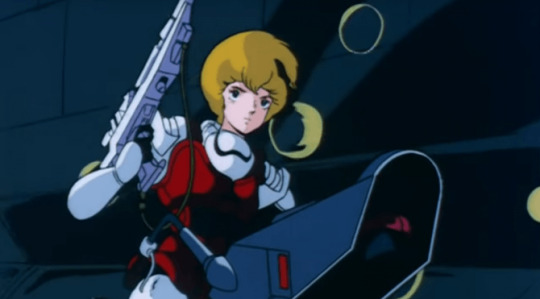
What is the cause of being in that place in your life? What can lead someone to want to feel close to people, but then be desperately afraid of being close to people? I think we all know what the answer is with Dana. It's that her parents left her on Earth at ten years of age, seemingly never to return. I'm sure Rolf Emerson and uncles Rico, Bron and Konda did their best to bring her and Bowie up but I mean those two kids are messed up. They're both in need. You watch the Masters Saga and these are both kids in really weird places in their lives. Neither of them are necessarily happy. Neither of them are happy at all. Bowie is not comfortable being a part of this military machine at all. They're both longing for something else. I think in the context of Robotech you can take that back in their psychology to being unhappy as a result of not getting to properly reach adulthood with their parents. Knowing that their parents are off doing something else that was seemingly more important than them.
In the Titan series Simon [Furman’s] done a great job of crafting this thing that has the bones of Macross, but brings this most important character back inside of it. During Simon's story when Dana comes out of hibernation I would guess she's about 30 years of age. She comes into a world just before she would have been born.
read more: The Robotech Comics Are Making Dana The Star
In my story, and I won't spoil the end of Simon's story, in my story, she's still there. Ten years later. Max and Miriya never got together. Dana's never been born. Things seem okay. So what's the point of Dana? Where does she belong? Did she ever matter to her parents? They just left her. I mean we know as human beings; of course she mattered to her parents. [When] they left her behind, in their minds, it was to protect her.
Dana carries this with her. Dana, now a 40 year old woman living in her own past where the only version of her is this middle aged version. It is a story about her own broken nostalgia. The way that we could almost have nostalgia for the Robotech that we grew up with. Looking back on these stories that we enjoyed as kids, she's looking back at a time where she was happy as a child, but knowing what's about to happen is the moment that ruined her life.
And she might have to experience that all over again.
In this case her parents aren't even a couple, so what is the point of it all? What was the point of her saving the universe, coming back in time and saving maybe this universe? Or maybe every timeline? She doesn't know yet. What was the point of her existence [if this] doesn't really matter? If this timeline can continue forward without her. What part does Dana Sterling play in the universe, and meta texturally, in the story of Robotech?
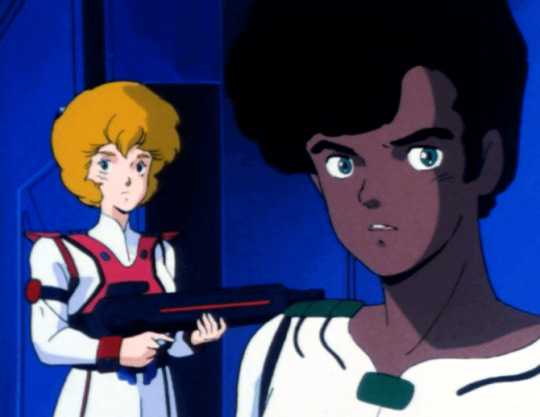
So many people with Robotech say, "You can just skip that second part. Who needs it?"
To the title, Robotech: Remix, what point does a character originating from Southern Cross have to do in amongst other characters originating in another show called Macross?
You're taking somebody who wasn't supposed to be there and dropping them in.
For the most part, in the way that Robotech was assembled from three series back in the early '80s, there were very few instances of footage from one series being edited into the other. There were some shots of the Masters being edited into Macross to help tell the Robotech story. There are very few instances where we are seeing that mash up for real happening.
It's interesting in the original show that the Masters Saga is the one that suffers the most from having to be welded next to Macross because they have to change the most to make it work.
I love people talking about re-imagining what Southern Cross could have been. Not to say, I think they did an amazing job with it to turn it into the Masters. It actually gives the child of Max and Miriya more depth. I mean more depth than she had as Komilia in spin off Macross stuff. It's so interesting to see people imagine what it would have been like if Carl Macek had decided to make Lana (Nova in Robotech) the "Dana Sterling" character because her temperament is a little more like Komilia from Macross. Her hair color is the same as Komilia. It seemed like that would have been the natural fit, but the decision to make Jeanne be the child of the Sterling's, to turn her into Dana, is a really interesting one. It brings us to where we are today and it gives me so many gifts for the series that I'm doing now.
read more: Things You Didn't Know About The Creation of Robotech
You're reading between the lines for both The Masters Saga and Southern Cross?
I'm looking at both. I'm looking at Masters, but I'm also looking at Southern Cross. I'm now working in a space where there are no limits to the way a character can exist. Simon rewrote those rules through the series he did with Brian Wood and this "Event Horizon" thing. All bets are off now. This is the world that I get to play in.
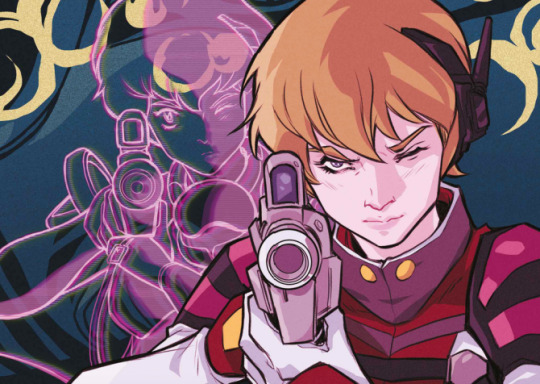
What was that like for you when you were first handed the idea of doing this comic? Did you know all these things were going to happen?
No, no, no. When (former Titan Comics Senior Brand Manager) Chris Thompson invited me to go out for coffee for him, I suspected this was wanting to talk to me about Robotech. I sat down with him and I said, "All cards on the table, I'm only interested in working on my own IP right now. I've got a lot on my plate. I am a huge Robotech fan. Massive Macross fan. I think they're perfect as they are and I appreciate what you guys are doing with the comic, but I can't imagine that there's anything that I want to do with it creatively that's going to be enough to take me away from my own things that I'm building."
Then he told me what Brian and Simon were doing with their series and what "Event Horizon" would actually be and what that could mean for what I could do into the future, and I think I might have used a few swear words. I hung my head and I said, "It's too cool and it feels like it would probably be the most fun thing I could ever work on." Then I asked him a question about characters that I could use and the way I could use them, and he said, "Yeah, no limits man." I just about lost it. I did leave the meeting saying, "Let me think about it. Let me think about it." It went on to be a little bit of a negotiation, but my mind was reeling.
I think everything that Simon and the guys have put together is fantastic. Very humbled and very nervous to be filling their giant shoes with this. I don't think I can. I can do something fun with a little bit of a different flavor. I think that was why Chris had asked me to take it over. He knew I was a big fan. It's why it's being relaunched I think because the tone's different.
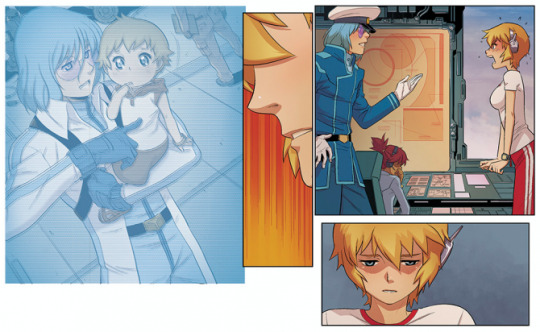
In what way?
Well you can see just from the approach to the art and the artists that I'm bringing in. It's definitely got a more anime flavor to it. If you've read any of my other work, it is not as straightforward and head down serious as the harder sci-fi military approach that Simon and Brian had used. My tone varies. I like to be able to shift over to that when it's appropriate. The stuff that attracted me to Robotech to begin with is the soap opera stuff. Slice of life stuff, the love triangles, is why I was in it. I mean I love the cool transforming robots, but the love triangle was what sold it to me. That's where I am with this, not to say that there is a love triangle.
read more: How Robotech Was Ahead of its Time With Representation
I think Macross as an ongoing franchise has really cornered the market in making sure that every iteration, every sequel has one very powerful love triangle. To the extent that the last series was called Delta and has the symbol of a triangle and there are songs called "Triangular." I love that, I think it's great. I don't think that should form the core of what a great Robotech story is but I think the interpersonal relationships are integral and they need to be front lined, for me, to feel invested. So I think we've got a great sci-fi military set up. What I want to do is take that and deliver you the interpersonal stuff that will break your heart within the sci-fi military set up that I've been handed.
I think I can kind of spoil a little bit here. I think your readers can put together just from looking at the covers what this is. We've got middle aged Dana reliving her past, in a situation where she doesn't exist as the child that should be there. Her parents have never gotten together. This is, to be a little crude and break it down to its barest elements; it's Back to the Future with Dana trying to get Max and Miriya together so that she can feel like she has a place in this universe.
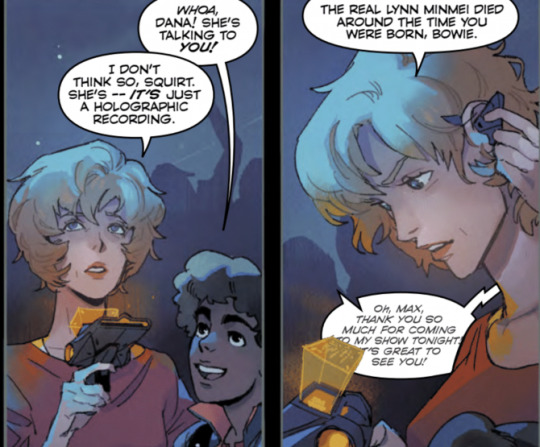
We've already seen a little bit of that in the back up stories. Is the purpose of those back stories to set up things for your run? Does it take place before that run?
Yes, it takes place before the run and there are some elements to the "Curtain Call" story that seem innocuous that are actually critical to larger reveals that will happen in maybe my third arc of the story. Down the road. Minmei is one of those. What happened to Minmei. If you're reading "Curtain Call" in the back of the "Event Horizon" stories, you'll note that she is no longer alive and part of what's shocking in that story is that she has seemingly returned, but in the form of a hologram during a concert. But, is that just a recording? What's the deal with that? If this isn't Minmei, well who's doing this and why? What's the purpose?
Not to say that all of that will be resolved in the last "Curtain Call" installment, but you'll certainly get a clue as to who is behind it, but why is another matter. I think they are a bunch of clues about why as well.
So then the title Robotech: Remix itself, talk a little bit about that. How does that play in? I've noticed even on the covers that we've seen, there's a little bit of vapor wavy look to them.
At its core for me, Robotech is one of the first artifacts of remix culture in greater pop culture. I mean it might not be, it's a corporate entity. It's a thing that was done to meet a demand. Not an audience demand, but a business demand, but being able to get a program into syndication in the early '80s. Hitting an episode number and just piling stories on to another story just to get a certain number. I think it’s unprecedented, incredible. I think that remix art has a place in the world above and beyond the artistic bones that we're used to creating as a being, as a living, breathing thing. I think that I want to honor that with this series.
read more: The VF-1 Valkryie: A Truly Iconic Mecha Design
I think again that Simon and Brian Wood have provided me a great context to do that. Robotech is, to me, this great work of early remix culture in a way. Opening all these other doors that Simon's opened, it's taking this to the 'nth level here. So I get to actually make a comment within the narrative and in another textural way about what that means to the characters to coexist in places that they suspect they shouldn't. Maybe that they are better for, or greater, or changed in a profound enough way to find value in that coexistence. Then the meta textural way for us to understand how and why these things happened in media in the eighties and how we can talk about it now in a way that makes sense and enhances those things that we loved from the past and seeing them in new ways in the present and into the future.
I'm a big fan of all this stuff. I think that there are smarter people who can talk about it academically, but what I can do is give you a little bit of commentary, food for thought, within the new narrative that I can present. Hopefully if you're taking that into account when reading this story. I'll let you look to the future of the overall Robotech narrative through a different lens.
Where can it go as a comic? Where can it go outside of the comic once you understand it in this context? Once you understand that Dana Sterling can live through the Masters Saga, live through the New Generation, rediscover her parents and her other sibling born in space, Maia Sterling, then there's the Shadow Chronicles. A bunch of other stuff happens and she has to go back in time and relive some of it without her, but also understand that there are other timelines, other universes, other worlds. What does that mean to her? What does that mean to the other characters? What does that mean to the future of Robotech as a brand?
read more: The Robotech/Macross License Has Been Extended
All these different things around them, they could be a part of, they all could have some impact.
What does that mean for us as creators? Or even fans? What do you want to see then as a fan? I know what I want to see. I'm going to try to put that in the story.
Can you give us a little bit of an idea of what that might be?
What can I say? I may have already said too much.
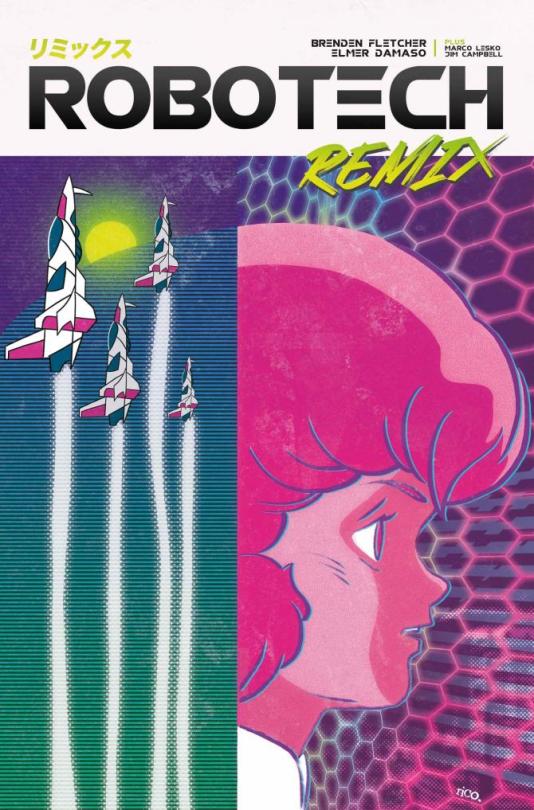
That's fine. What I find interesting about what you're saying and about Dana re-experiencing her life and I'm sure this is intentional because of how deep you've done this. You literally having her experience deja vu all the time in reference of course to the Southern Cross opening theme. Was that intentional?
Again, it's much like Robotech, experiencing her life again, but not the exact same way. It is changed, it is different. It's interesting to me that you say she lived through all of that, went back through time and she's still having issues with her parents. She hasn't dealt with all of this stuff. Exploring that would be something I'm very interested to see. Yes. That is the crux of this thing.
In a way are you, because it could have been very easy in another version of this comic to just tell the Masters Saga and do it "better." Have it be more connected. Not having the weird boy crazy stuff. Whatever else. Now you're telling a story and being able to comment on it without changing it either. Was that important for you to do?
Yeah. I think honoring what Simon and Brian have all labored over for these years is important to me. I feel like when I'm picking up the baton I don't want to say no to any of the choices that they made coming in. I want to put my best foot forward from that point that they left behind. I feel like what I'm doing is the natural extension of where Simon has left it. I also don't want to spoil the end of "Event Horizon".
I'm sure there are other choices that could have been made. I'm sure I could have pitched something else. This is what I want to see after knowing "Event Horizon". After just looking at what I find interesting about these characters. Looking at the part also of Robotech that maybe had the most heavy-handed edit to it, to make it make sense. Even in of itself, to make it an appealing thing where Southern Cross had maybe failed on a few accounts. Finding what about it could be magic in the context of Robotech and then rewriting it and re-editing it to play to its strengths on its own and within the context of a larger saga. It's all very interesting.
The characters of Jeanne versus Dana are very interesting. These are all things that I'm looking at and commenting on in a way. A thing that we don't talk about as creators in the Robotech world very much is where everything came from. I want to do that. I want to talk about the importance of Jeanne Fránçaix as a character. I want to talk about the importance of "Deja Vu" as an opening theme song. I mean, I don't want to reveal in this interview how/why I'm thinking about it, or how that exactly factors in. It's important to me that we acknowledge the past while we're remixing to create the present and the future.
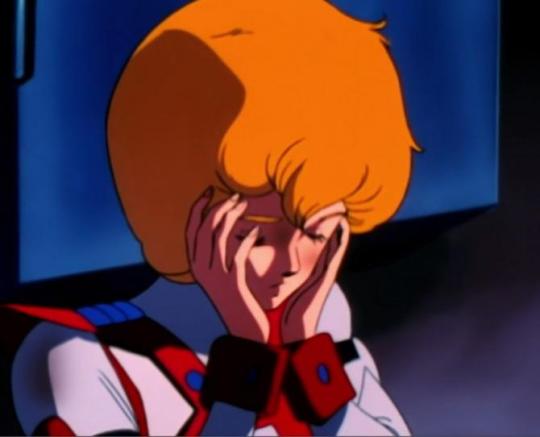
Are there any pivotal moments from the original Masters Saga that really stood out to you that really informed your writing of Dana?
All those moments where she has a breakdown. That moment in that back alley and she's got the things that became the Cha-Cha's. That moment where her artifice is down, she loses her mask. Or basically every scene with Bowie. Thinking about why Dana's mask is important for her [and] for Bowie. As kids who grew up for a number of years almost as siblings. Dana feeling for this young boy who's in a place that he shouldn't be and wanting to protect him. Knowing that he is suffering emotionally the way she is, but he can't cover it. [She tries to] lift him up through her own performance.
In "Dana's Story" she sees Bowie's not having a great time. She's like, "Oh I'll sing. No. I'll tell you a story."
That is exactly it. I think you can see it in "Curtain Call". Bowie is a 10-year-old boy in this story. Dana is a 40-year-old woman. She has watched her best friend be born and grow to a 10-year-old boy. She knows what happened with her Bowie in the past. As much as she felt protective of Bowie during the Masters saga, imagine that now with a bunch of years later and she's almost in a parental role with a young version of her best friend. Knowing what could become of him. Knowing where his heart is and wanting to do anything in the universe possible to protect it.
Just the fact that she took him to a music concert.
This is not Macross. It's not all about music, but also, in every part of the Robotech saga, with the exception of Shadow Chronicles and Love Live Alive, music played a pivotal role. It's part of the culture war against the Zentradi. In Masters Bowie is obviously a musician and that's where his heart is. He would rather play music than fight. Dana even plays guitar. Musica had a hand in controlling the clones through music. It goes without saying that in the New Generation we have Yellow Dancer.
As a kid that stuff was so important to me. I grew up around music. My parents were musicians and it’s part of what sent me to Robotech. That music played such an integral role in every part of the saga. Again, not in the way that Macross has grown in Japan over the years to be something bigger with Delta having a girl group of essentially, magical girls whose music is central to the storyline. That's not what Robotech's about. To me, when I want to see a new chapter of Robotech there has to be music in it somewhere. So that will play a part in everything that I'm doing here.
On just a side note, a little easter egg (in Curtian Call) Bowie's wearing his Casio size portable keyboard on his back and his strap says, Sato Dan on it. The two composers of the Southern Cross score. I'm a big nerd. Have you listened to the music score? Speaking of taking a thing and making it your own, there are pieces of music in there that are almost direct lifts from other bands. There's an action cue that's essentially "Synchronicity II" by The Police.
Video of The Police - Synchronicity II Video
Here's the super deep cut question, because we know in the show about Maia Sterling who showed up in Shadow Chronicles. We assume that's the same one that we saw in that weird vision at the end of Masters. What about the one that Dana mentions with Zor where he says, "Do you have a boyfriend?" and she answers, "No, I just had a brother."
I don't know if I should say anything. It might be something that is addressed in the very concrete way in the story.
read more: The Biggest Stories From San Diego Comic-Con
Do you have anything else to say for the fans that are going to be reading this? People who might be coming to this for the first time. In the past it’s ostensibly been said, "you can read the Robotech comic if you've never seen the series."
It's my goal to make this super readable, but I'm also coming into it adopting a massive cast and entire saga of stories that take place before mine. I admit that it's a challenge to make it streamlined. My inner fan, what I want to see out of it, but also presenting it as a clean, easily readable story. I hope it's appealing to everybody. I can't pull myself far enough away from it to know that it is or not. I almost have to have the finished first issue and give it to my wife and ask her, "Does this make sense to you?" Everyone else whose read it is sort of too deep in the weeds to know for sure. It is my goal to make it something super accessible while also answering a lot of questions that my inner fan needs answered.
Shamus Kelley is a pop culture/television writer and official Power Rangers expert. Follow him on Twitter! He also co-hosts a Robotech podcast, which covers the original series and the new comics. Give it a listen! Read more articles by him here!
facebook
twitter
tumblr
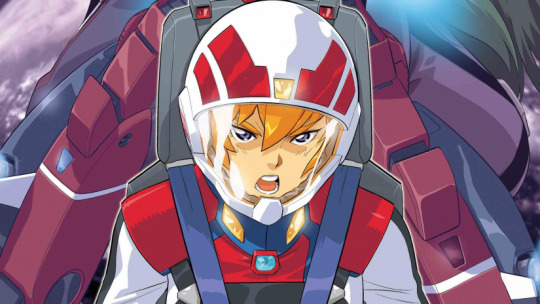
Interview Shamus Kelley
Jul 30, 2019
Robotech
SDCC 2019
SDCC
from Books https://ift.tt/2MqeA3O
0 notes
Photo
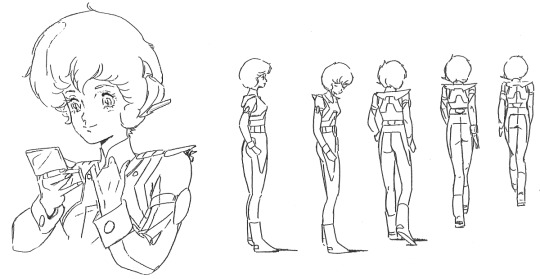
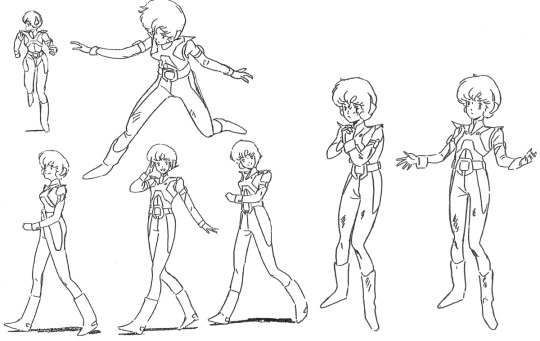
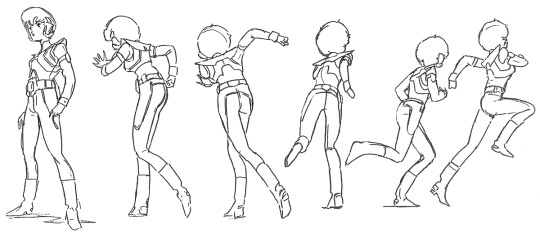
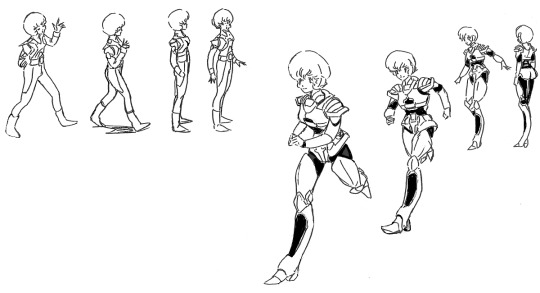
Jeanne Fránçaix ジャンヌ・フランセーズ
164 notes
·
View notes
Photo
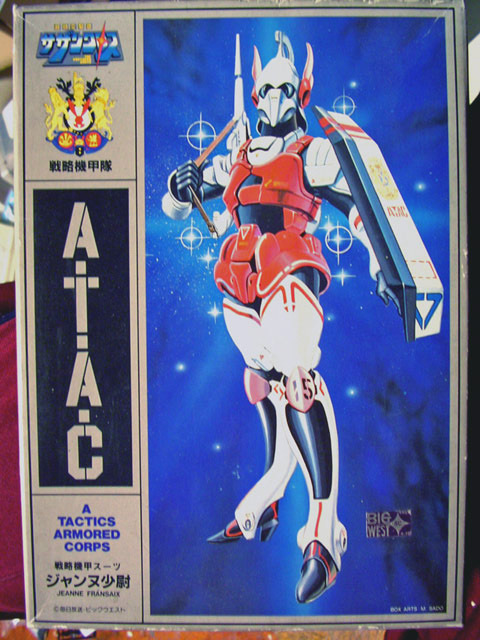
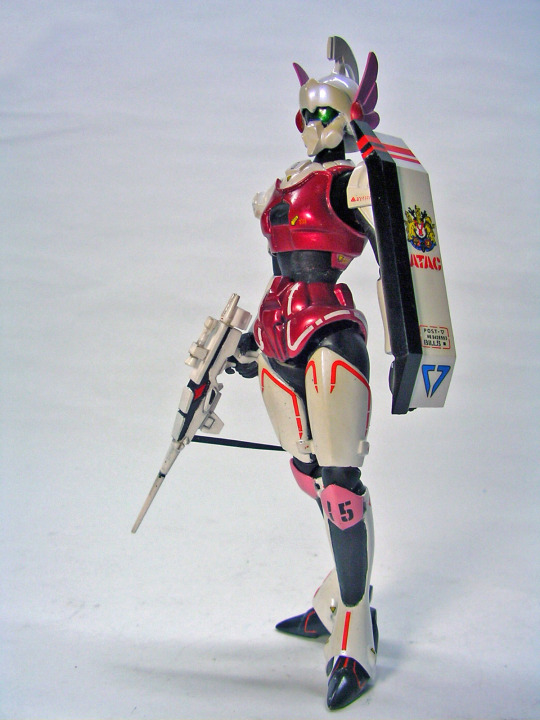
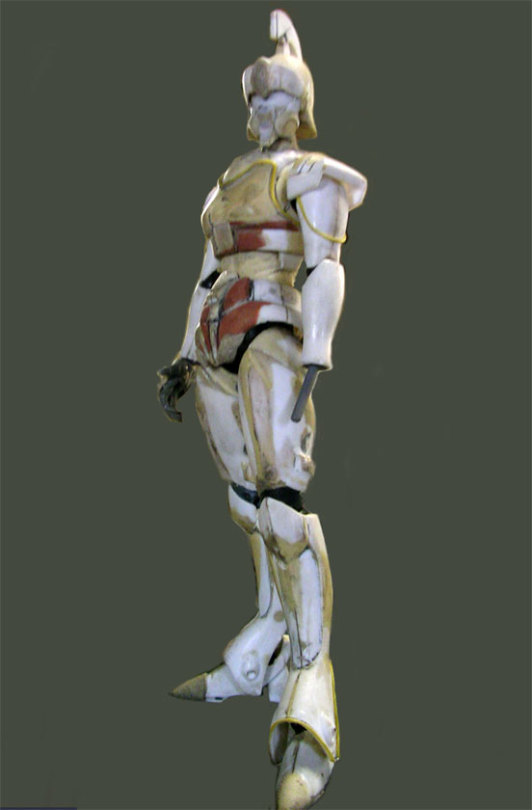
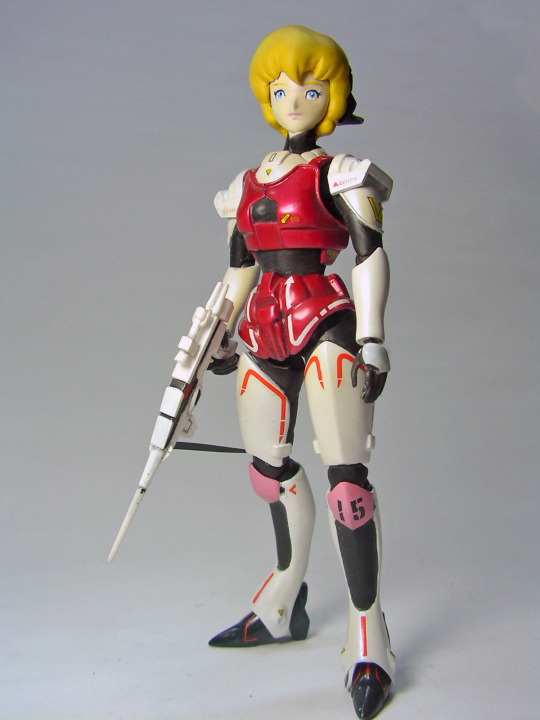
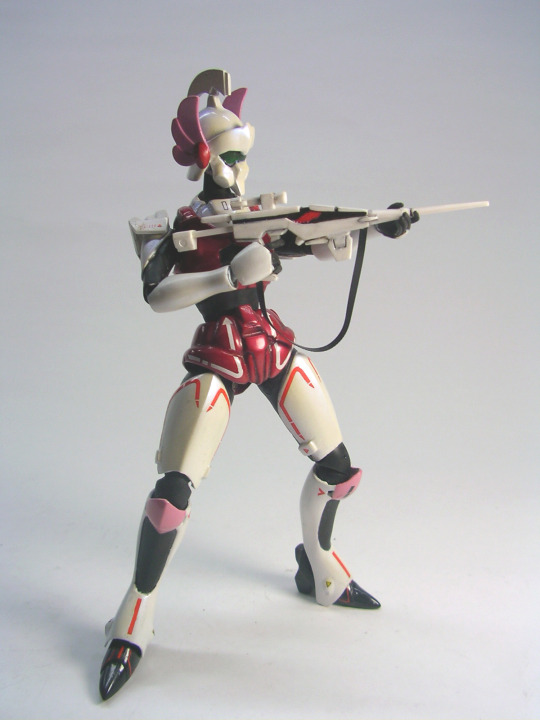
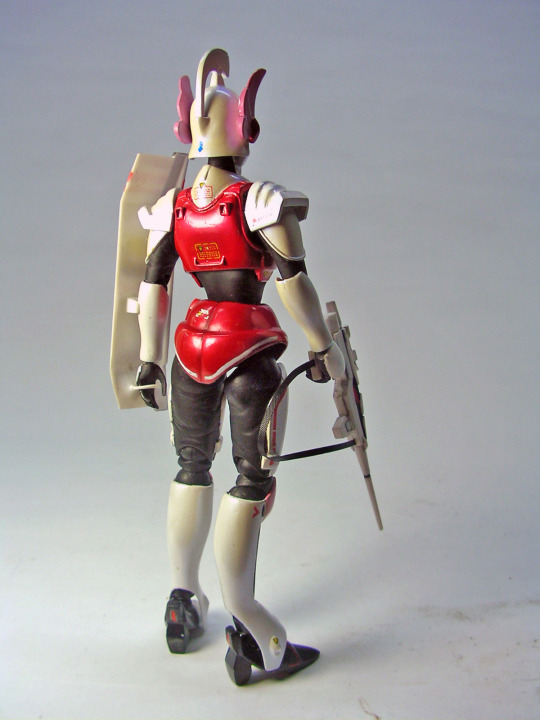
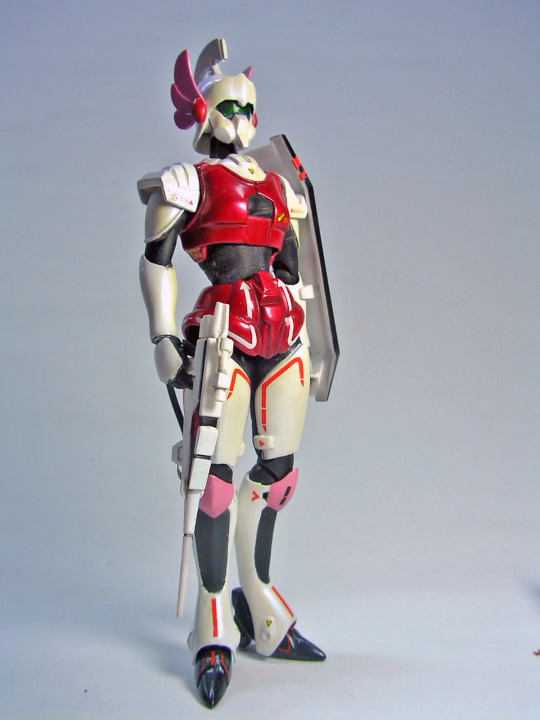
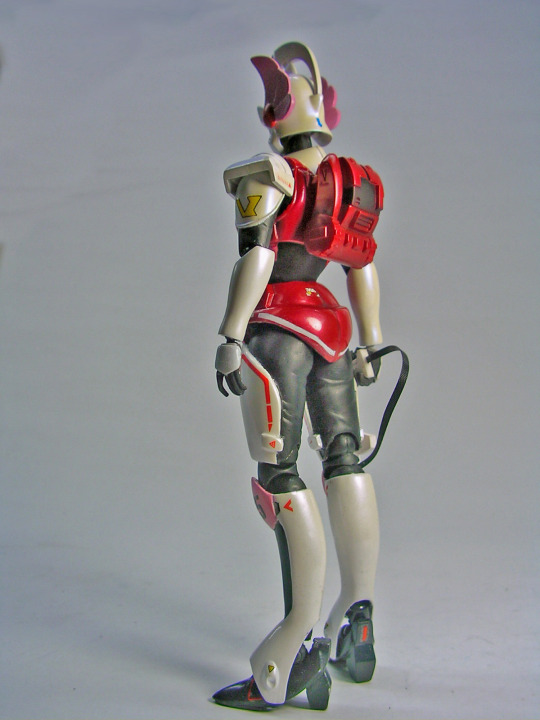
#超時空騎団サザンクロス#ジャンヌ・フランセーズ#super dimensional cavalry#southern cross#jeanne fránçaix#anime#80s anime#atac
114 notes
·
View notes
Photo
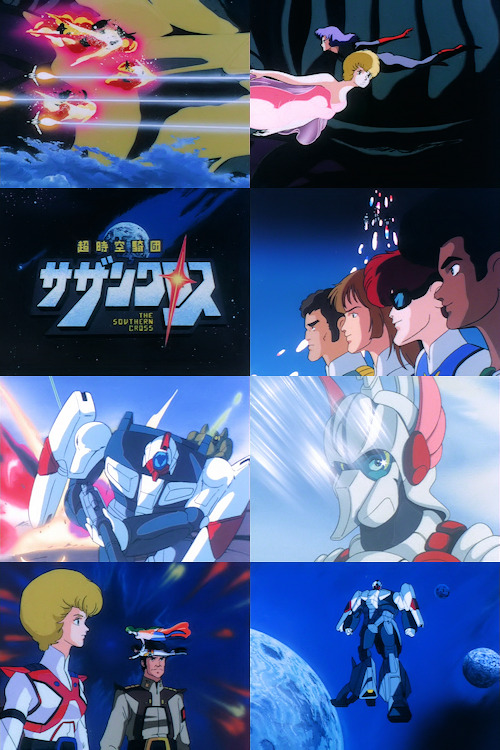
星のデジャ・ブー
#hoshi no deja vu#jeanne fránçaix#seifriet weiße#andrejz slawski#charles de etouard#louis ducasse#bowie emerson#rolf emerson#musica#超時空騎団サザンクロス#星のデジャ・ブー#super dimension cavalry southern cross#robotech
61 notes
·
View notes
Photo
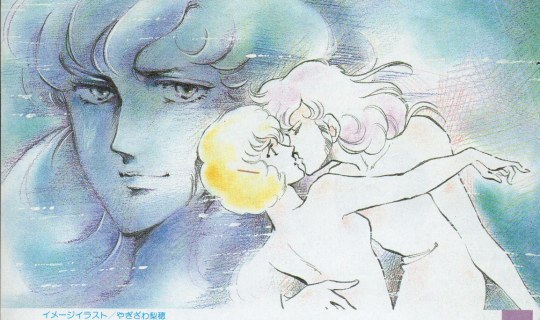
Seifriet and Jeanne from THE ANIME ‘84, illustrated by “Rio” (やぎさわ梨穂)
#super dimension cavalry southern cross#やぎさわ梨穂#jeanne fránçaix#seifriet weiße#rio is my personal lord and saviOR GOODBYE
183 notes
·
View notes
Photo
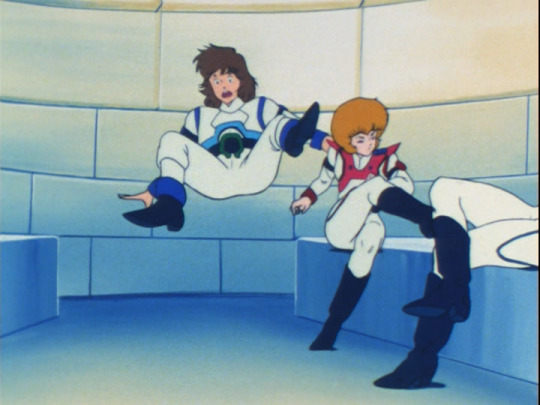
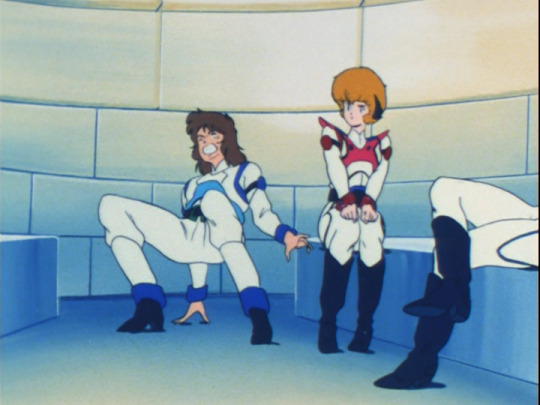
sweep kick
#charles d'etouard#jeanne fránçaix#super dimension cavalry southern cross#this whole movement is so beautifully animated#note to self gif it later
9 notes
·
View notes
Photo
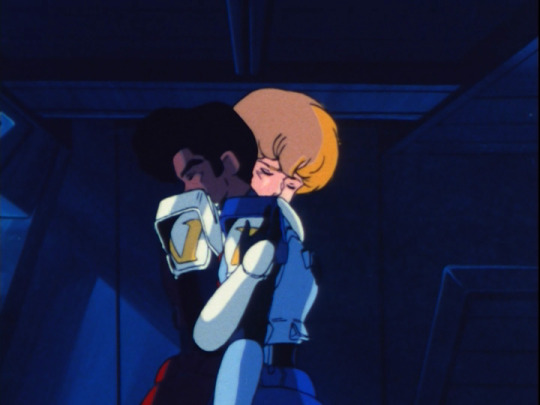
BABIES
I've seen numerous people argue over the years that Bowie confessing he'd loved Jeanne was "completely out of nowhere" and "totally unjustifiable with the series"
to which I always go are we watching the same show oooorrrrr...
#bowie emerson#jeanne fránçaix#super dimension cavalry southern cross#i could've shipped it#but he and musica and she and seifriet tho#power couples to the fucking max
15 notes
·
View notes
Photo
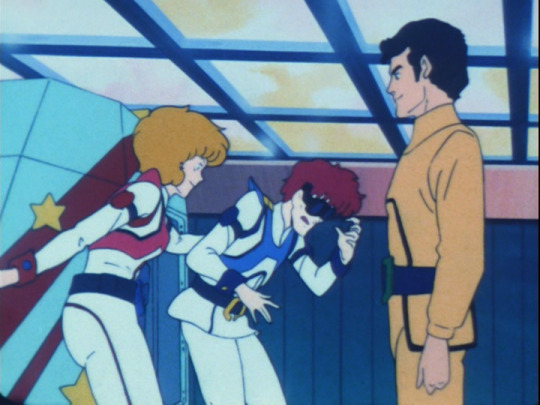
BACKPATS
4 notes
·
View notes
Photo
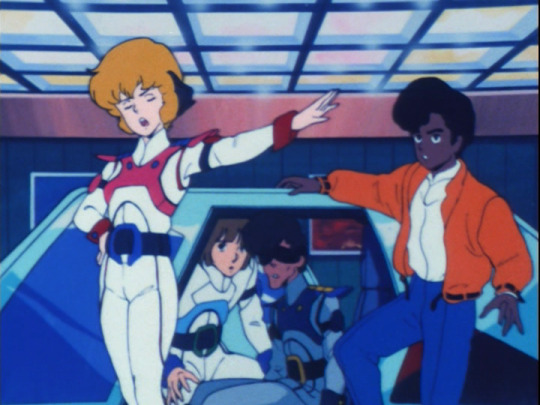
"SHUT UP"
#jeanne fránçaix#bowie emerson#louis ducasse#charles d'etouard#super dimension cavalry southern cross#lol it looks like she's shoving bowie#i want his jacket
3 notes
·
View notes
Photo
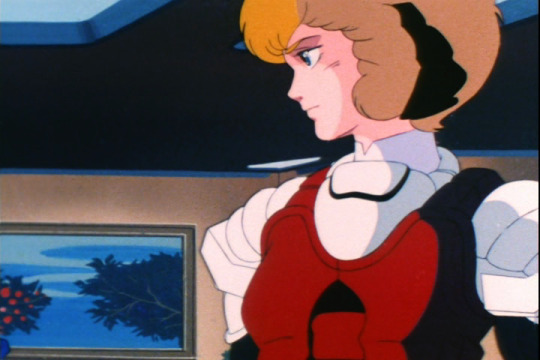
4 notes
·
View notes